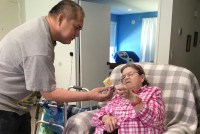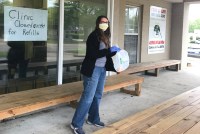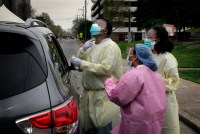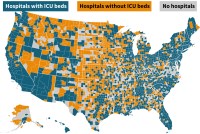Latest KFF Health News Stories
‘Just Make It Home’: The Unwritten Rules Blacks Learn To Navigate Racism In America
Darnell Hill, a mental health caseworker, is teaching black teens in St. Louis how to safely walk through the park, run to the store or handle an encounter with the police. Beyond tangible skills, he offers comfort and a semblance of control to those for whom birding, running or walking down the street hold the risk of racial violence.
COVID-19 Batters A Beloved Bay Area Community Health Care Center
Health clinics in isolated African American communities in the San Francisco Bay Area provide crucial services to neglected populations. But like thousands of other community clinics around the nation, their finances have been wrecked by the pandemic shutdown.
Baltimore’s ‘Squeegee Boys’: ‘If We Don’t Go Out, We Don’t Eat’
The federal government’s relief package left behind many of America’s poorest workers struggling to make ends meet as the coronavirus ravaged and unemployment rose. Baltimore’s “squeegee boys” are among them.
KHN’s ‘What The Health?’: Protests And The Pandemic
The outrage over the death of an African American man, George Floyd, after he was restrained and knelt on by Minneapolis police officers has sparked national protests, including in places where the coronavirus is still spreading. Meanwhile, President Donald Trump’s attempt to withdraw the U.S. from the World Health Organization could have ramifications for Americans. Alice Miranda Ollstein of Politico, Mary Agnes Carey of KHN and Joanne Kenen of Politico join KHN’s Julie Rovner to discuss this and more. Also, Rovner interviews Jonathan Oberlander, a University of North Carolina health policy professor and the editor of the Journal of Health Politics, Policy and Law, about articles examining the COVID-19 pandemic through the lens of health inequity and structural racism.
Efforts To Curb Congenital Syphilis Falter In COVID’s Shadow
A new federal report sheds light on the reasons newborn syphilis rates are on the rise despite simple treatment options. But amid the COVID-19 pandemic, public health departments will struggle to respond.
Por qué los recortes en salud perjudican siempre a los californianos más vulnerables
En California, donde casi 2,9 millones de personas han solicitado el desempleo en los últimos dos meses, Newsom describió los recortes propuestos como “prudentes” y “estratégicos”.
‘Why Do We Always Get Hit First?’ Proposed Budget Cuts Target Vulnerable Californians
Safety-net health care programs that keep low-income Californians out of nursing homes are on the chopping block as Gov. Gavin Newsom and state lawmakers attempt to plug a massive budget deficit caused by the COVID-19 emergency.
As COVID Cuts Deadly Path Through Indiana Prisons, Inmates Say Symptoms Ignored
Since the start of the pandemic, prisoners and their families have contradicted state officials about the conditions inside Indiana prisons. Many inmates report they’ve had no way to protect themselves from close contact with other inmates and staff members. They believe contracting the coronavirus is inevitable.
Estatus racial y pandemia: una mezcla combustible
El aumento de casos y muertes por COVID-19 en comunidades minoritarias ponen en relieve cómo los determinantes de salud pesan en la dinámica de una pandemia.
Racial Status And The Pandemic: A Combustible Mixture
The novel coronavirus is affecting black Americans disproportionately, which some community leaders and public health experts say is not surprising. So why didn’t anyone sound an alarm?
Must-Reads Of The Week From Brianna Labuskes
Newsletter editor Brianna Labuskes wades through hundreds of health care policy stories each week, so you don’t have to.
Must-Reads Of The Week From Brianna Labuskes
Newsletter editor Brianna Labuskes wades through hundreds of health care policy stories each week, so you don’t have to.
Free Clinics Try To Fill Gaps As COVID Sweeps Away Job-Based Insurance
The volunteer medical providers at the Tree of Life Free Clinic in Tupelo, Mississippi, give crucial health care to the uninsured in the best of times, drawing crowds who line up for hours. Amid the current COVID pandemic, clinic staffers were advised to close. Instead, they chose to adapt — even without critical N95 masks to protect themselves — as the economic crisis intensifies the need for free care.
Must-Reads Of The Week From Brianna Labuskes
Newsletter editor Brianna Labuskes wades through hundreds of health care policy stories each week, so you don’t have to.
The Other COVID Risks: How Race, Income, ZIP Code Influence Who Lives Or Dies
Federal officials have known for nearly a decade which counties are most likely to suffer devastation ― both in loss of lives and jobs ― in a pandemic.
Cómo la raza, el ingreso y el código postal influyen en quién vive o muere por COVID-19
Algunos expertos sostienen que las condiciones sociales y económicas, ignoradas durante mucho tiempo, son indicadores poderosos de quién sobrevivirá, o no, a la pandemia.
Must-Reads Of The Week From Brianna Labuskes
Newsletter editor Brianna Labuskes wades through hundreds of health care policy stories each week, so you don’t have to.
Long-Standing Racial And Income Disparities Seen Creeping Into COVID-19 Care
Many health officials around the nation have not released data on the ethnic and racial demographics of people tested for the new coronavirus. But public health experts said the anecdotes are adding up, and they fear the response to the pandemic will result in predictable health care disparities.
Must-Reads Of The Week From Brianna Labuskes
Newsletter editor Brianna Labuskes wades through hundreds of health care policy stories each week, so you don’t have to.
Millions Of Older Americans Live In Counties With No ICU Beds As Pandemic Intensifies
A Kaiser Health News analysis shows that counties with ICUs average one ICU bed for every 1,300 older residents, those most at risk for needing hospitalization.



















